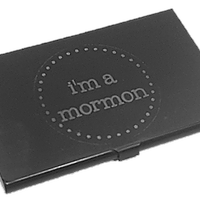The Clash of Money and Religion
There seems to be an inherent clash between money and religion.
We are taught that “money is the root of all evil” right? Wait a minute. Isn’t there something missing in that scripture quote? It actually comes from 1 Timothy 6:10, which goes “For the love of money is the root of all evil: which while some coveted after, they have erred from the faith, and pierced themselves through with many sorrows.”
So it is the love of money that is the root of all evil, not money itself. This issue came to mind when " mentioned Oil Vault on his Facebook page. His Facebook mention was certainly appreciated, as we are a small startup and trying to get the word out about our product. What I found interesting is that while most of the comments towards John and Oil Vault were positive, there were several comments that were fairly negative, such as:
“Making money off of religion. I thought Mormons were against that. But then again, that's how John puts bread on the table.”
- Scott
“Hmm spend £5 once on an oil vial that stays on my keys which goes everywhere with me... or spend $1.99-$85.00 for whenever I run out of oil on satchets of pre packed oil... because who doesn't like somebody making lots of money off of people who just want to do their Priesthood duty.”
- Ally
“I'm sad that John Bytheway has stooped to retail propagandizing. L”
-Clay
Camel Going through the Eye of a Needle
The conversation about Oil Vault even followed over to Mormon Dialogue. Now, everyone is certainly entitled to their own opinion and I respect those that disagree with the product or the price. What I found to be interesting and unanticipated was that because something is an LDS product, the producers cannot make money off of it. So why is there an inherent conflict for some people when money and religion are intertwined?
Maybe it is because there are some scriptures that lead us down that path. For example, there is the often quoted scripture in Luke 18:22-25 that states, “When Jesus heard this, He said to him, ‘One thing you still lack; sell all that you possess and distribute it to the poor, and you shall have treasure in heaven; and come, follow Me.’ But when he had heard these things, he became very sad, for he was extremely rich. And Jesus looked at him and said, ‘How hard it is for those who are wealthy to enter the kingdom of God! For it is easier for a camel to go through the eye of a needle than for a rich man to enter the kingdom of God.’”
First of all, I cannot help myself but to correct an often mistaken interpretation of this scripture. When Christ refers to the eye of a needle, he is not referring to a needle that someone uses for sowing. Rather, this verse of scripture refers to Christ talking about a narrow entrance into the city of Jerusalem, a gate known locally as “the eye of the needle.” The gate was so small that a camel could only be brought through with great difficulty by squeezing through on its knees. By squeezing through on bended knee, the parable explains how we humbly need to come to the Lord.
So in part, the scripture explains how we need to be humble to enter into the kingdom of God. However, the parable does not end there. If you continue to read in Luke 18:26-27 it states that, “They who heard it said, ‘Then who can be saved?’ But He said, ‘The things that are impossible with people are possible with God’.”
Christ further explains that even if a rich man were to humble himself, that is not all that is required of salvation, e.g., getting a camel to stoop and squeeze through a narrow gate might be challenging, but it doesn’t require divine intervention. Apart from the intervention from Christ, entering into the kingdom of God cannot be done.
The actual meaning of this scripture is not that salvation is difficult, but rather that it is humanly impossible for everyone by any human means to enter the kingdom of God, including the wealthy, those who love money, or those who are poor. Sinners cannot hold on to their sinful priorities and personal control and think they can come to God on their own terms. The young man illustrates that reality.
Luke 18:25 is a clear testimony from our Lord on the inability of man to do anything to save himself. This doctrine of total inability is a vital component to the gospel; it highlights the impossibility of salvation apart from the Atonement of Christ.
Parable of the Talents
The parable that I further think is helpful in understanding money, is the parable of the talents. This parable can be found in Matthew 25:14-30. To summarize the parable: a master puts his servants in charge of his goods while he is away on a trip. Upon his return, the master assesses the stewardship of his servants. He evaluates them according to how faithful each was in making wise investments of his goods to obtain a profit. It is clear that the master sought some profit from the servants’ oversight. A gain indicated faithfulness on the part of the servants. The master rewards his servants according to how each has handled his stewardship. He judges two servants (one having two and another having five talents) as having been “faithful” and gives them a positive reward. To the single unfaithful servant (having one talent) who “played it safe,” a negative compensation is given.
If we were to equate the talents to money, one of the servants received 5 times the salary as the other servant. For example, if the servant who received the one talent got a salary of $50,000 a year, then the servant with the five talents got a salary of $250,000 a year. So if one servant received so much more than the other, how is this fair? Surely if the servant that only received $50,000 had instead received $250,000 he could have done so much more with the money, right?
To think this way misses the point of the parable. The parable illustrates it is not how much money the servants make, but rather how they use their talents or money for the purposes that Heavenly Father directs the servants to use them for. If we have been given much then much is required. If we make a lot of money, then we are required to do good with that money. If we only make a little money, the parable still teaches that we are required to do good with that money.
Conclusion
With those parables in mind, why is there still the inherent clash between money and religion. I think it has to do with what we see people doing with their money. We watch the news and we see so much corruption among the rich (and newsflash it also happens with those who have less money we just do not see it on the news). If all we saw on the news was how rich people were being charitable works and helping others (which many of them do, we just do not see it on the news) then our perspective on money would change.
I also think that we have to change our perspective of how much is too much. One of my favorite sayings goes something like, when people complain about someone else having too much, you know how much those people think is too much? More than what they have. I often find (myself included) that too much is one more car than I have, a house with more square feet than mine, a bank account that has more money in it than mine.
If we are to change the perspective on money and religion, it is through understanding first that money can and is used by many to do good things, and just because someone earns a profit for a good or service does not mean they are evil. They can be offering a great product or service that others value and are compensated accordingly. We also have to stop judging what is too much for others. Heavenly Father may have entrusted them with much because they are able to manage the money for him and do a lot of good with it. Once we begin to change our perspective on the roles money and religion play in our lives, then Heavenly Father can then use us to bless others regardless of our salary or economic status.



